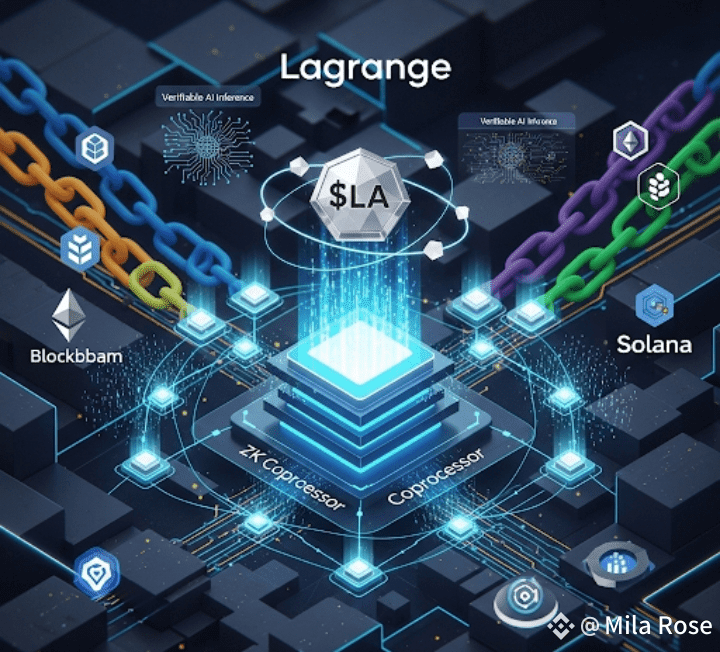The blockchain world craves speed, scalability and verifiable trust. While Zero-Knowledge Proofs (ZKP) offer a powerful solution, their complexity and computational demands have often been a bottleneck. @Lagrange Official is at the forefront of solving this, building a revolutionary decentralized ZK Proof network and ZK Coprocessor to deliver highly efficient and verifiable computing solutions across the entire blockchain ecosystem. This is not just an incremental improvement; it's a fundamental upgrade to how dApps function.
The ZK Challenge: Centralization, Cost and Complexity
Current ZK proving solutions often face hurdles:
Centralized Provers: Many ZK systems rely on centralized provers, introducing single points of failure and trust assumptions.
High Computational Cost: Generating ZK proofs, especially for complex computations, is resource-intensive and expensive.
Developer Barriers: Integrating ZKPs into dApps typically requires specialized cryptographic knowledge.
These factors limit the widespread adoption of ZKPs for common Web3 challenges like cross-chain communication, off-chain computation and verifiable AI.
Lagrange's Game-Changing Architecture: Decentralized ZK and ZK Coprocessor
Lagrange is tackling these challenges head-on with a two-pronged approach:
1. The Decentralized ZK Proof Network:
Trustless Proving: Unlike centralized solutions, Lagrange leverages a network of decentralized provers. This ensures that proof generation is trustless, resilient, and censorship-resistant.
Scalable Proof Generation: By distributing proving tasks across many nodes, Lagrange can generate proofs for complex computations much faster and more cost-effectively.
Collaboration with EigenLayer: Lagrange enhances its decentralized network by collaborating with platforms like EigenLayer, leveraging its restaking mechanism to secure the prover network and further decentralize its operations. This brings the security guarantees of Ethereum's economic finality to off-chain computations.
2. The ZK Coprocessor:
Verifiable Off-Chain Computation: The ZK Coprocessor acts as a powerful engine for off-chain computation. It allows dApps to perform complex calculations off-chain, generate a ZK proof of correctness, and then verify that proof cheaply on-chain. This dramatically reduces gas costs and network congestion.
General-Purpose ZK: It's designed for a wide range of applications, including:
Cross-Chain Interoperability: Enabling secure and efficient communication and value transfer between different blockchains with strong ZK guarantees.
Decentralized Computing: Powering resource-intensive computations for dApps without burdening the main chain.
Verifiable AI Inference: Proving the correct execution of AI models on-chain, crucial for transparent and auditable AI in Web3.
The LA Token: Powering the Verifiable Future
The native $LA token is the lifeblood of the Lagrange network, facilitating its decentralized operation:
Governance: LA holders will participate in governing the ZK Proof network, voting on key protocol parameters and upgrades.
Staking: Participants stake LA tokens to become provers, bidding for proof generation tasks and earning network fees and rewards for their computational work. This incentivizes a robust and efficient proving ecosystem.
Network Utility: LA is used to pay for proving services, creating a direct economic loop between users, provers and the protocol.
Lagrange isn't just building a feature; it's building essential infrastructure that unlocks the full potential of ZK technology for Web3. By making verifiable computation accessible, efficient, and decentralized, Lagrange is paving the way for a new generation of high-performance, secure and trustless blockchain applications.
#lagrange LA - Verifiable computation and democratized.




